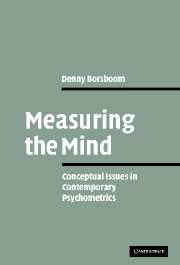2 - True scores
Published online by Cambridge University Press: 22 September 2009
Summary
Nothing, not even real data, can contradict classical test theory …
Philip Levy, 1969Introduction
In September 1888, Francis Ysidro Edgeworth read a paper before Section F of the British Association at Bath, in which he unfolded some ideas that would profoundly influence psychology. In this paper, he suggested that the theory of errors, at that point mainly used in physics and astronomy, could also be applied to mental test scores. The paper's primary example concerned the evaluation of student essays. Specifically, Edgeworth (1888, p. 602) argued that ‘… it is intelligible to speak of the mean judgment of competent critics as the true judgment; and deviations from that mean as errors’. Edgeworth's suggestion, to decompose observed test scores into a ‘true score’ and an ‘error’ component, was destined to become the most famous equation in psychological measurement: Observed = True + Error.
In the years that followed, the theory was refined, axiomatized, and extended in various ways, but the axiomatic system that is now generally presented as classical test theory was introduced by Novick (1966), and formed the basis of the most articulate exposition of the theory to date: the seminal work by Lord and Novick (1968). Their treatment of the classical test model, unrivalled in clarity, precision, and scope, is arguably the most influential treatise on psychological measurement in the history of psychology.
- Type
- Chapter
- Information
- Measuring the MindConceptual Issues in Contemporary Psychometrics, pp. 11 - 48Publisher: Cambridge University PressPrint publication year: 2005
- 1
- Cited by



